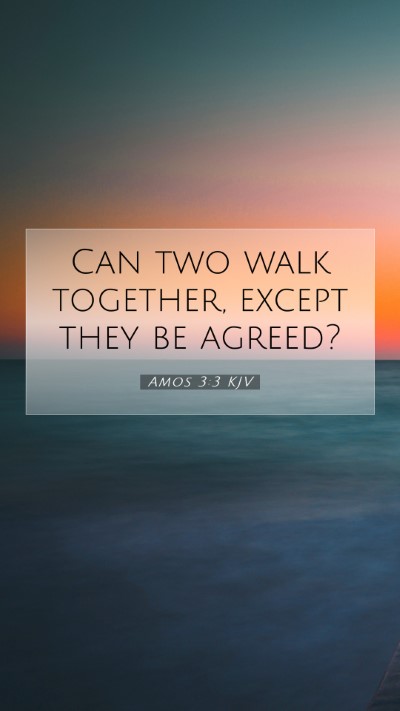Old Testament
Genesis Exodus Leviticus Numbers Deuteronomy Joshua Judges Ruth 1 Samuel 2 Samuel 1 Kings 2 Kings 1 Chronicles 2 Chronicles Ezra Nehemiah Esther Job Psalms Proverbs Ecclesiastes Song of Solomon Isaiah Jeremiah Lamentations Ezekiel Daniel Hosea Joel Amos Obadiah Jonah Micah Nahum Habakkuk Zephaniah Haggai Zechariah MalachiAmos 3:3 Meaning
What is the meaning of Amos 3:3?
Can two walk together, except they be agreed?
Amos 3:3 Bible Verse Meaning
Understanding Amos 3:3: A Deep Dive into Its Meaning
The verse Amos 3:3 states, "Can two walk together, except they be agreed?" This concise phrase encapsulates profound biblical truths regarding unity, agreement, and the nature of divine relationships.
In this analysis, we will explore the verse through the insights of public domain commentaries, such as those by Matthew Henry, Albert Barnes, and Adam Clarke. Together, we will uncover its deeper meanings and implications for both individuals and communities within the context of scripture.
Verse Explanation and Context
Amos, a prophet during the 8th century BC, addressed the moral decay and social injustices within Israel. His prophecies emphasized the necessity of returning to God and recognizing the consequences of national sin.
Scriptural Analysis
According to Matthew Henry, this verse emphasizes the importance of harmony and mutual agreement among God's followers. He suggests that the "walking together" symbolizes a shared mission or faith, indicating that unity is essential for a collective journey of faith.
Albert Barnes elaborates that the phrase indicates a spiritual truth—two must agree to progress together. Without agreement, conflict and division will arise, rendering any joint endeavor ineffective. This applies not only to human relationships but also to our relationship with God, which requires alignment and consent to His will.
In Clarke's commentary, he highlights that the rhetorical question posed in the verse calls the audience to introspection—are we truly in alignment with God's principles? It serves as a reminder that walking with God necessitates a commitment to His ways and an understanding of His character.
Application in Daily Life
The implications of Amos 3:3 extend beyond theological interpretation; they invite practical application. Believers are encouraged to reflect on their relationships—both with others and with God. The importance of agreement serves as a foundation for community and collective endeavors in faith, exemplifying the need for alignment in values and beliefs.
- Community Unity: Engage in Bible study groups that foster understanding and agreement on scripture, ensuring the foundation of relationships is rooted in shared beliefs.
- Personal Reflection: Regularly assess personal alignment with God's principles—are you 'walking together' with Him in agreement?
- Conflict Resolution: In contentious relationships, use this verse as a guide to seek understanding and common ground, promoting reconciliation where disagreements exist.
Cross References
Amos 3:3 connects richly with several other Biblical texts that reinforce the themes of agreement and unity:
- 2 Corinthians 6:14: "Be ye not unequally yoked together with unbelievers..." – highlighting the importance of shared beliefs.
- Matthew 18:19: "Again I say unto you, That if two of you shall agree on earth as touching anything that they shall ask..." – underscoring the power of agreement in prayer.
- Philippians 2:2: "Fulfill ye my joy, that ye be likeminded, having the same love, being of one accord..." – urging believers to maintain unity in the spirit.
Conclusion
The meaning of Amos 3:3 extends beyond a mere inquiry about walking together; it serves as a profound reminder of the necessity for agreement within relationships, urging believers to align with God's will and one another in the pursuit of faith. The collective journey of walking with God requires mutual understanding and commitment, a theme central not only in this passage but throughout the entirety of Scripture.
As you engage with this verse, whether individually or within Bible study lessons, reflect on the nature of your relationships and your own walk with God. Seek concordance with His teachings and with those you journey alongside.


